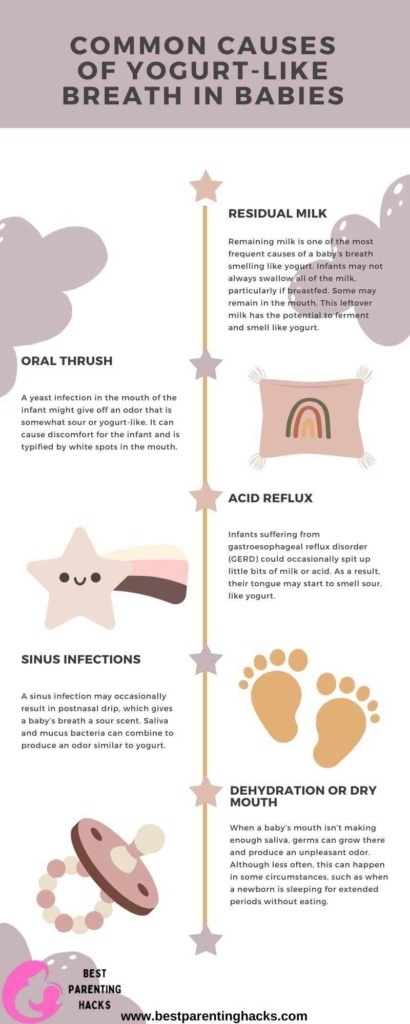Table of Contents
One of the most wonderful things about becoming a parent is being close to your child and observing their innocence and purity. We frequently become more aware of the little things because of this intimacy, like the smell of their breath. A baby’s breath is usually fresh and pleasant, indicating that they have been nursing. But occasionally, parents experience a startling turn of events: their infant’s breath smells like yogurt. This unusual smell can be perplexing and, occasionally, cause for alarm. Is it an innocent infantile quirk or a symptom of a more serious health problem?
When answering the headline question, “Why does my baby’s breath smell like yogurt?” it’s critical to recognize that parents frequently notice this. The odor of yogurt is frequently a harmless trait associated with dental hygiene and eating habits. But occasionally, it might point to certain medical issues that would need to be attended to. This article explores the several components that contribute to this distinct aroma in an attempt to demystify this phenomenon. Parents may better take care of their baby’s dental health and general well-being by being aware of the causes.

Common Causes of Yogurt-Like Breath in Babies
1. Residual Milk: Remaining milk is one of the most frequent causes of a baby’s breath smelling like yogurt. Infants may not always swallow all of the milk, particularly if breastfed. Some may remain in the mouth. This leftover milk has the potential to ferment and smell like yogurt.
2. Oral Thrush: A yeast infection in the mouth of the infant might give off an odor that is somewhat sour or yogurt-like. It can cause discomfort for the infant and is typified by white spots in the mouth.
3. Acid Reflux: Infants suffering from gastroesophageal reflux disorder (GERD) could occasionally spit up little bits of milk or acid. As a result, their tongue may start to smell sour, like yogurt.
4. Sinus Infections: A sinus infection may occasionally result in postnasal drip, which gives a baby’s breath a sour scent. Saliva and mucus bacteria can combine to produce an odor similar to yogurt.
5. Dehydration or Dry Mouth: When a baby’s mouth isn’t making enough saliva, germs can grow there and produce an unpleasant odor. Although less often, this can happen in some circumstances, such as when a newborn is sleeping for extended periods without eating.
You Might Also Like to Read: Baby Makes Humming Noise When Sleeping
Understanding Baby’s Breath
A newborn’s breath offers a fascinating insight into their overall health and nourishment. Typically, it carries a subtle sweetness, derived from their rich milk-based diet. While the aromas of breast milk and formula may vary due to their unique compositions, an infant emitting yogurt-like fragrance warrants further exploration into the underlying cause.
1. Dietary Influence: Babies typically start their meals with milk during the few months of their lives. Milk primarily consists of lactose, a type of sugar. When this sugar breaks down in the mouth, it might occasionally smell like yogurt, particularly if the milk residue stays in the baby’s mouth for a long time.
2. Bacterial Activity: Similar, to when we grow up a baby’s mouth harbors a range of microorganisms. Fermentation may result from the interactions between these bacteria and the leftover milk and saliva. This approach can produce a variety of odors, including one that is yogurt-like.
3. Digestive Processes: The baby’s digestive system may occasionally be connected to the smell. For example, a newborn with moderate reflux may burp up partly digested milk, which contributes to the yogurt-like fragrance.
4. Oral Hygiene: If the baby’s mouth isn’t cleaned thoroughly, milk residues may build up and ferment, giving off an unpleasant smell similar to yogurt. This is especially apparent if the infant nods off without cleaning their mouth after eating.

Dietary Influences
The diet of an infant greatly influences the odor of their breath. The components of breast milk and formula milk differ, which may affect how a newborn smells when they breathe.
1. Breast Milk Composition: The natural sugars and fats included in breast milk can give a baby’s breath a pleasant, creamy smell. But if they’re not well cleansed, these sugars can ferment in the mouth and give off an odor similar to yogurt.
2. Formula Milk: Despite having a distinct composition, formula milk is meant to resemble breast milk. A baby’s breath may smell different from other babies’ due to additional sugars or various types of proteins in some formulae.
3. Introduction of Solid foods: Babies’ breath may alter when they begin to eat solid meals. Foods with potent smells, such as onions or garlic, can change how their breath smells.
4. Frequency of Feeding: Often-feeding babies may have less noticeable milk residue in their mouths, which may lessen the chance of a yogurt-like odor.
5. Hydration Levels: Sustaining a healthy balance of oral bacteria requires enough water. A dry mouth brought on by dehydration may worsen the fermentation of milk leftovers.
Oral Hygiene in Infants
It is important to uphold proper dental hygiene to avoid a baby’s breath smelling like yogurt. To ensure that babies receive the right dental care, follow these four steps:
1. Regular Cleaning: After each feeding make sure to wipe your babys gums using a soft cloth. This helps prevent the growth of germs and assists, in getting rid of any leftover milk.
2. Use of Infant Toothbrush: Use a soft-bristled infant toothbrush as soon as your baby’s first tooth erupts. To clean the teeth and gums, use a soft brush.
3. Avoiding bedtime bottles: Make an effort not to give your child a bottle before bed. Bad breath might result from milk that sources in the mouth overnight.
4. Regular Dental Checkups: Plan your child’s first dental appointment by the time they become one year old. Frequent examinations can assist in detecting and treating any problems with dental health early on.
You Might Also Like to Read: Signs of an Under-stimulated Baby

When to Seek Medical Advice
It’s important to be vigilant, for any persistent odors emanating from your baby’s breath. Here are some situations, in which it is advisable to seek advice:
1. Persistent Bad Odor: You should see a physician if your baby’s breath consistently smells like yogurt and does not go away with better dental care.
2. Accompanying Symptoms: Fever, fussiness, feeding difficulties, or weight loss may indicate an underlying health problem if the peculiar breath odor is accompanied by these symptoms.
3. White Patches in Mouth: If your infant has white patches in his mouth in addition to a bad odor, he may have oral thrush, which has to be treated by a doctor.
4. Changes in Feeding Habits: Acid reflux or other digestive problems may be the cause of your baby’s refusal to eat or pain while eating.
5. Difficulty Breathing: A respiratory infection or sinus problem may be the cause of foul breath if it is accompanied by breathing problems or a chronic cough.
Preventive Measures and Home Remedies
Take into account the following precautions and DIY solutions to keep your baby’s breath from smelling like yogurt:
1. Maintain Good Oral Hygiene: Your infant’s mouth and teeth need to be cleaned regularly, particularly right before bed and after meals.
2. Proper Feeding Techniques: To lessen the chance of acid reflux, make sure your infant is burped appropriately after eating.
3. Adequate Hydration: To sustain saliva production, which naturally cleans the mouth, give your kid plenty of water.
4. Clean Feeding Equipment: To avoid bacterial accumulation, sterilize bottles, pacifiers, and teething toys regularly.
5. Monitor Dietary Changes: As you start your kid on solid meals, consider how it can impact their general dental health and breath.

Conclusion
In conclusion, a baby’s breath tasting like yogurt is typically not a reason for alarm, even if it might be an interesting occurrence. It is often caused by dental hygiene habits and nutritional factors. You may successfully control and avoid this recurrence by being aware of the common reasons and taking preventive action. Ensuring the health of your baby involves monitoring their well being offering them proper nourishment and scheduling regular dental care. However, it’s crucial to get medical attention to rule out any underlying health concerns if you detect recurrent foul breath or other worrisome symptoms. Remember that each infant is different, so what suits one might not suit another. Make sure to pay attention to your baby’s needs. If you’re unsure consult with professionals. By providing care and attention you can ensure that your baby’s dental health is, on the track.
FAQs
1. Is breath-like yogurt more prevalent in babies who are breastfed?
• Because breast milk naturally contains sugars, newborns who are breastfed often have sweeter breath. That being said unless there are additional factors—like dental hygiene or health issues—this may not always result in a yogurt-like fragrance.
2. How do I keep my infant from getting oral thrush?
• It is essential that the nursing mother and the infant both maintain proper dental hygiene. Sterilizing bottles and pacifiers regularly also aids in halting the fungal overgrowth that produces thrush.
3. How can I tell if my baby has acid reflux and why their breath smells like yogurt?
•Your baby may have reflux if they regularly spit up, look uncomfortable after feedings, or have difficulties gaining weight.
4. Can a baby’s breath smell alter as a result of a sinus infection?
• Bacterial accumulation brought on by sinus infections can provide an unpleasant odor that is sometimes mistaken for yogurt.
5. Is it wise to worry about my infant’s dental health before their first teeth erupt?
• It’s crucial to clean your baby’s tongue and gums even before teeth erupt to avoid germs and milk residue accumulation.
6. How frequently should I brush my infant’s teeth?
• Gently cleaning your baby’s mouth at least twice a day is a good idea, especially right before bed and right after feedings.
7. When should I get my child’s breath checked by a doctor?
• It’s best to see a doctor if you detect a persistently bad odor or if it’s accompanied by other symptoms like pain, unusual fussiness, or trouble eating.




